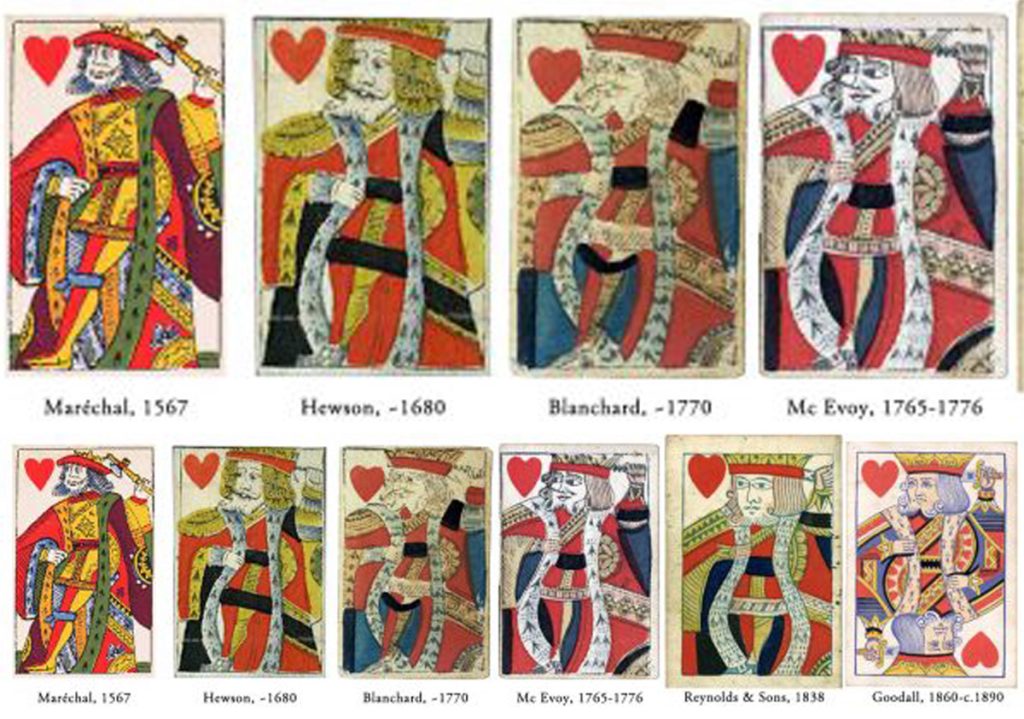Playing cards have a rich history spanning hundreds of years. This has given us enough time to come up with sayings and nicknames for practically every card in the deck. There’s the Suicide King, the Axe-Man and the notorious Ace of Spades – and, anyone heard of the Beer Card? Here’s a little delve into some cool card superstitions.
The Suicide King (and Other Card Nicknames)

The Suicide King and Other Card Nicknames
By Alex J Coyne ©Great Bridge Links
Playing cards have a rich history spanning hundreds of years. This has given us enough time to come up with sayings and nicknames for practically every card in the deck. There’s the Suicide King, the Axe-Man and the notorious Ace of Spades – and, anyone heard of the Beer Card? Here’s a little delve into some cool card superstitions.
King of Hearts
The King of Hearts is sometimes also referred to as The Suicide King. Of course, it might have something to do with the fact that he is the only royal in the deck who appears to be killing himself – horribly, and with swords. There are many stories about why, but the most common one seems to be due to a misprint. The original playing cards came from hand-drawn designs that were copied and recopied over time. The “suicidal” pose likely came from a printing error or simplification. Early versions may have shown the king holding a battle axe or sword behind his head. Over time, that weapon began to appear as if it was going through his head due to changes in the artwork.
Sometimes, the King of Hearts is identified with Charlemagne (Charles the Great), the medieval emperor who ruled much of Western Europe. This is in part to 15th France where card makers began naming the face cards after famous historical or biblical figures. The King of Hearts was linked to Charlemagne, King of Diamonds was Julius Caesar, King of Spades was King David (from the Bible), and the King of Clubs was Alexander the Great. These associations were not universal. They were specific to a tradition in French-suited cards and were not always used consistently. Modern decks no longer label the cards with names, but the character design of the King of Hearts still reflects some older ideas — such as holding a sword, possibly indicating Charlemagne’s warrior image.
The Suicide King has appeared in books, movies, and games as a symbol of tragedy, madness, or intensity. The nickname is mostly used informally among card players and collectors.
Other Traits of the King of Hearts are that he often appears facing forward, unlike the other kings, who are in profile, and he is the only king without a mustache in many traditional card designs.
King of Diamonds
In modern card decks, the King of Diamonds appears to be the only one of the Kings holding an axe – and this has earned him the name of the Axe-Man (sometimes the Man with the Axe instead).
Common or Thematic Nicknames:
- Rich King – based on the diamond suit’s association with wealth and material goods.
- Money King – informal, sometimes used in card slang or themed games.
- Julius Caesar – in traditional French decks, the King of Diamonds is said to represent Caesar.
- Merchant King – symbolizes commerce, trade, and power through wealth.
- King of Coin – mirrors the equivalent Tarot suit (Coins or Pentacles = Diamonds).
- Crown of Wealth – poetic or fantasy-styled nickname.
- The Tycoon – modern nickname implying business success and power.
- Gold Crown – tying in the precious stone/wealth theme.
- The Dealer – in storytelling, can imply power, money, and influence.
King of Spades
Some believe that the King of Spades signifies the Biblical King David. Interestingly, confederate soldier Robert E. Lee was called the “King of Spades” because of his order to have trenches dug – and the soldiers’ hate for him as a result.
Common or Thematic Nicknames:
- King of War – spades are often linked to battle, strength, and conflict.
- David – in some historical French decks, the King of Spades represents the biblical King David.
- Warlord – thematic nickname based on the suit’s link to swords or military power.
- Black King – refers to the color and suit.
- King of Swords – aligns with Tarot, where Swords = Spades.
- Shadow King – often used in fantasy or storytelling, implying mystery or authority.
- The Strategist – spades are tied to intellect and strategy in symbolic systems.
- Grim Crown – stylized or poetic nickname for the more serious nature of the spade suit.
- Iron King – symbolizes strength, rigidity, or stern rule.
Queen of Hearts
The Queen of Hearts is said to be associated with the biblical figure Judith (sometimes Judic) in early card decks. Later English-printed decks would sometimes change the royal-references depending on who was relevant at the time.
Common or Thematic Nicknames:
- Love Queen – reflects the heart suit’s association with love and emotion.
- Red Queen – used sometimes interchangeably, though more often linked with Alice in Wonderland‘s character.
- Sweetheart – casual nickname drawing from the “hearts” theme.
- Valentine – symbolic name tying into love and affection.
- Heartbreaker – a playful or ironic nickname, especially in stories or songs.
- Lady Love – romantic or poetic nickname.
- Queenie – casual, affectionate version, often for any Queen card.
- Cup Queen – drawn from Tarot, where Cups = Hearts.
- Scarlet Queen – dramatic or fantasy-inspired name.
Queen of Spades
The Queen of Spades is sometimes associated with Pallas – that’s the Goddess Athena to everyone else. In old-school poker games, you’ll sometimes hear her referred to as Calamity Jane, a famous frontierswoman.
Common or Traditional Nicknames:
- Black Lady – used in the game Hearts, where the Queen of Spades is often a penalty card.
- Black Maria – British slang for the Queen of Spades in some trick-taking games.
- Old Maid – in some older versions of Old Maid, the unmatchable card is the Queen of Spades (though not always).
- The Curse – due to its high penalty in Hearts or Piquet.
- Witch – used symbolically in folklore and superstitions.
- The Widowmaker – a dramatic nickname used in poker slang or card lore.
- Dark Queen – poetic or gothic variation.
- Queen of Sorrows – occasionally used in literature or symbolic references.
- Spaderella – playful, invented name
Queen of Clubs
In the card game Find the Lady, the Queen of Clubs is the card known as the Lady – alternatively, the Black Widow or the Black Maria. Of course, the Queen of Clubs is also referred to as Argine. (Also the nickname for the AI system powering Funbridge!). An answer on Funtrivia.com mentions that Argine is an acronym of Regina – Latin for Queen.
Common or Traditional Nicknames:
- Queen of Battle – clubs are often associated with action, strength, or conflict (like clubs as weapons).
- Argine – in historical French decks, the Queen of Clubs is sometimes associated with Argine, an anagram of “Regina” (Latin for queen).
- Dark Lady – refers to the black suit and can be used in stories or symbolic decks.
- Warrior Queen – aligns with the club suit’s representation of force or leadership.
- Queen of Wands – from Tarot, where Wands correspond to Clubs.
- Forest Queen – clubs can also be seen as branches or wooden clubs, symbolizing nature.
- The Fighter – suggests strength and perseverance.
- Black Branch – a poetic twist referencing both suit and color.
- Power Queen – clubs are often associated with energy and drive.
Other Cards and the Scottish Curse
Seven of Diamonds: The Beer Card
The Beer Card has been around for a long time – in bridge, it says that you’re owed a beer by your partner if a last trick is won with a seven of diamonds from your hand. (We guess Youth Bridge players might have to call this one the soda card until 21!)
Here are some unwritten ‘beer card rules:’
It usually applies only to declarer, but in some circles, defenders can also win a beer.
The contract must be made.
The declarer or defender wins the last trick with the 7♦.
The play must not have risked the contract just to win with the beer card.
Nine of Diamonds: The Scottish Curse
Basically, we know that the Nine of Diamonds makes some superstitious card players nervous, and has been so for a few hundred years.
The Scottish Curse card has a few origin stories. One states that it originates from the Duke of Cumberland, who supposedly wrote an execution order on a playing card – any guesses which one?
Four of Clubs: The Devil’s Bedpost
Also called The Devil’s Four-Poster or The Devil’s Bedstead, the Four of Clubs is considered by some to be a very unlucky card to hold – so unlucky that it can affect the rest of your hand and make you lose the game. According to the International Playing Card Society, it could be linked to cartomancy (the use of cards for divination), where the Four of Clubs is a bad omen:
This card warns of a major setback, an unexpected set of circumstances that must be prepared for. It is also said that this card can be thought of as “Murphy’s Law” when used in readings.








